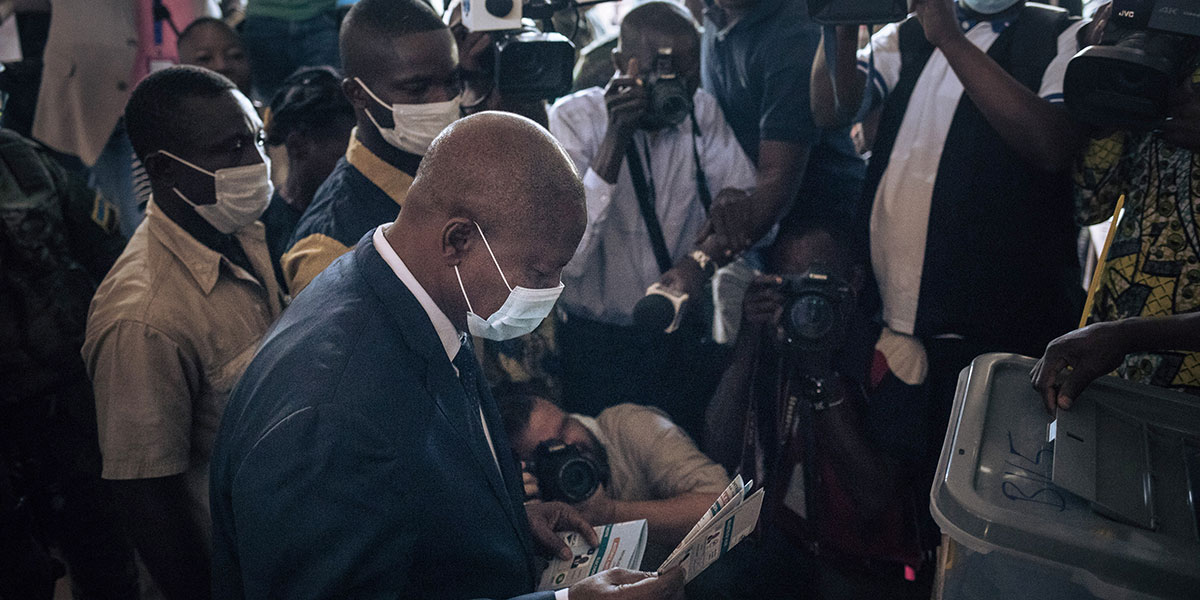The first case of the COVID-9 pandemic in the CAR was detected on 14th March 2020 in the Mbaiki District located about 105 kilometres from the capital city, Bangui. However, the disease spread to the rest of the country at a relatively lower rate and magnitude with fewer victims compared to other countries.
Today, the COVID-19 pandemic seems to have been contained particularly in Bangui and the countryside at large. According to a World Health Organisation (WHO) report, CAR recorded 5,087 confirmed cases of COVID-19 and 64 deaths from 3 January 2020 to 29 March 2021.
The December 2020 elections are one example of how #COVID-19 is impacting every aspect of our lives, including our politics.
Tweet
CAR is one of many African countries that never imposed a total lockdown. In response to the initial outbreak, the government put in place a series of preventive and reactive measures to avert the situation, which among others included: mandatory wearing of face masks, hand sanitizing, social distancing, restriction on public gatherings and temporary closure of bars and restaurants. Infected individuals were quarantined in hospitals but the majority of patients with potential symptoms were closely followed in their respective residences due to the scarcity of medical facilities, while waiting for their COVID-19 test results.
The COVID-19 pandemic influenced the planning and preparation of the December 2020 general elections in CAR. At the beginning of the outbreak, the pandemic created panic and anxiety in the country to the extent that the CAR Government considered amending the electoral law to postpone the elections. However, the decision was too politically sensitive to be taken in the absence of a general political consensus. In view of the low level of COVID-19 infections and the challenges that could be associated with the postponement of the elections in CAR, the government took a decision to proceed with the holding of the general elections on 27th December 2020 as originally planned.
However, on the eve of the general elections, on 18th December 2020 six major armed groups under the coalition called “The Coalition of Patriots for Change” (CPC) was formed and declared war. They staged a series of simultaneous attacks with the intention of disrupting the elections, capturing the capital city and overthrowing the regime. CAR Government forces – also known by the French acronym: ‘FACA’ (Forces Armees Centrafricaines) supported by MINUSCA troops managed to secure the polling stations especially in the capital city Bangui.
The newly elected government will have to deal with the remaining political challenges, sustaining stability in the whole country, and responding adequately to the effects of #COVID-19.
Tweet
Timely and joint military intervention by the United Nations (UN) peacekeepers in support of FACA enabled the first round of presidential elections to be held on 27 December 2020. The incumbent President won the first round and was re-elected with 53.16% for a second five-year term in office according to the CAR Constitutional Court final results announced on 30th March 2021.
In the rest of the country, the CPC intensified the attacks and took control of main towns and cities. They disrupted legislative elections which were meant to be conducted in different provinces. This coalition claimed thousands of lives including MINUSCA peacekeepers.Consequently, according to Hon Augustin YANGANA-YAHOTE, Minister in charge of Territorial Administration and Decentralization, the voting process could not be conducted in 29 of the 71 sub-prefectures while six others hardly managed to partially vote and shut down the polling stations due to the armed groups’ intimidation during the first round of legislative elections.
In response to the disturbing security challenges that led to the interruption and disruption of legislative elections, CAR Government called on Russia and Rwanda to help secure the country. In response Russian troops, under a bilateral agreement, as well as additional Rwandan UN peacekeepers on loan from the UN mission in South Sudan, supported FACA and MINUSMA to restore peace and stability in the country so that the first and second run-off voting for legislative elections could be held where they had failed to take place. Allied forces and FACA took back all the major towns and cities from armed rebels who withdrew without fighting back. They retreated and occupied the outskirts of the major towns and cities initially captured and later surrendered.
Since then, relative security is reported to have returned in all 16 provinces of CAR. On 14 March 2021, the first round of voting was successfully conducted in 69 districts in which legislative elections could not be held in December 2020 as planned due to the armed groups’ attacks. At the same time, the run-off voting was held peacefully in 49 districts in the rest of the country.
In conclusion, the country is slowly returning to normalcy and the general security situation is by and large considered to be calm in Bangui and in other parts of the country. However, the newly elected government will have to deal with the remaining political challenges, including the political parties which boycotted the swearing-in ceremony, sustaining stability in the whole country, as well as continuing to respond adequately to the effects of COVID-19.
Claude Bizimana is the Office Coordinator in ACCORD’s Country Office in the Central African Republic.


